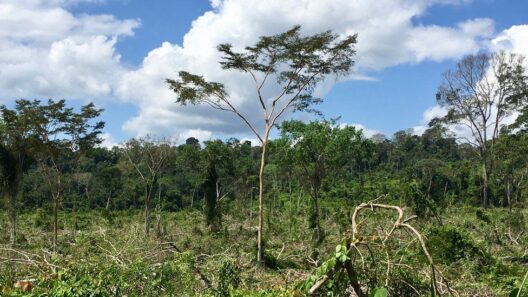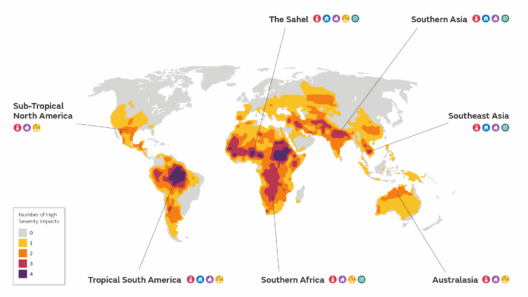As the world observes the staggering impacts of climate change, a palpable sense of urgency fills the air, leading many to ponder: Is this the beginning of a new climate era? This inquiry extends beyond mere speculation; it interrogates the profound transformations within our environment and society. A confluence of catastrophic weather events, rising sea levels, and unprecedented heatwaves has galvanized the discourse surrounding climate adaptation and mitigation strategies, unveiling profound insights into human resilience and the intricate tapestry of our ecological systems.
The phenomenon termed the “new normal” gains traction, likened to an unwelcome guest that persists beyond its expected duration. Observations indicate a disturbing frequency of extreme weather events, including intense hurricanes, droughts, and floods, which have become the mainstay rather than the exception. Communities across the globe are grappling not only with immediate humanitarian crises but also with the longer-term ramifications on socio-economic stability and public health. This emerging reality raises significant questions: Are we merely adapting, or are we reshaping existence as we know it?
The intricate dance between humans and nature has evolved dramatically in recent decades. Over the last century, anthropogenic activities have driven an astronomical increase in greenhouse gas emissions. Industrialization, deforestation, and urban sprawl have fundamentally altered the planet’s systems. Yet, inherent in this grim tale is a glimmer of hope: humanity’s capacity for innovation and adaptation. Cities are reimagining urban planning, integrating green infrastructure to curtail stormwater runoff, enhance biodiversity, and lower urban heat islands, thereby reflecting a shift in mindset from exploitation to stewardship.
However, the discourse surrounding these adaptations often skirts the surface of deeper, systemic issues that complicate our response to the climate crisis. Economic inequity, political inertia, and societal apathy form a triad of obstacles that inhibit substantial progress. Consider the stark disparities in resources between developing and developed nations. While wealthier countries possess the means to invest in cutting-edge technologies and sustainable practices, poorer nations often struggle to address dire necessities. Such inequities raise ethical dilemmas. How should global leaders navigate the moral landscape of climate justice, ensuring that those least responsible for climate change are not disproportionately burdened by its consequences?
The concept of climate resilience surfaces as another critical facet of this evolving narrative. Societies must cultivate the ability to rebound from adversities while simultaneously preparing for future calamities. This encompasses not just infrastructural adjustments, such as bolstering levees or enhancing drainage systems, but also social and economic reforms that foster equitable recovery. Community-driven approaches, which emphasize local knowledge and participatory governance, leverage the ingenuity of those most affected by climate impacts, thus enriching resilience strategies.
Crucially, the call for a paradigm shift transcends mere adaptation. It beckons an interrogative exploration into how we can redefine our relationship with the natural world. The anthropocentric worldview, which positions human interests above ecological balance, is being increasingly challenged by biocentric and ecocentric philosophies. These emerging perspectives foster a symbiotic relationship between humanity and nature, recognizing that human well-being is inextricably linked to the health of the planet. This recognition paves the way for not just sustainable practices, but regenerative approaches that actively restore depleted ecosystems.
Furthermore, educational initiatives worldwide are galvanizing public consciousness regarding climate issues. Schools, NGOs, and grassroots organizations are integral in disseminating knowledge about environmental stewardship. Raising awareness through education fortifies communal ties and equips individuals with the tools necessary for informed advocacy. Such grassroots movements can ripple outward, influencing policy decisions at higher governmental levels, thereby shaping a more sustainable future.
Yet, the question remains: what role does bias play in our perception of climate change? The phenomenon of climate fatigue—a psychological condition where individuals become desensitized to environmental issues—pervades public consciousness. A political landscape often fraught with denial and skepticism further complicates engagement. Breaking through this inertia requires collective storytelling that humanizes the climate crisis. Narratives that emphasize diverse experiences and perspectives cultivate empathy, prompting action over indifference.
The advent of technology provides a dual-edged sword in navigating this new climate era. While technological advancements yield innovative solutions—such as renewable energy systems, carbon capture technologies, and climate modeling—their deployment must be tempered with caution. Dependence on unproven technologies can divert attention from immediate, foundational changes in consumption patterns and lifestyle choices necessary for true sustainability.
In the grand tapestry of climate discourse, the intermingling threads of hope, grief, adaptation, and accountability formulate a comprehensive understanding of our current epoch. Each extreme weather event, policy decision, or grassroots initiative evokes a spectrum of emotions, yet together these elements underscore a defining moment in human history. As societies grapple with escalating climate realities, one question lingers: Are we ready to embrace this new climate era, redefine our existence in harmony with the natural world, and rise to the occasion of unprecedented challenges? The answer ultimately lies in collective action, informed advocacy, and unwavering resolve.
Indeed, maintaining sustained engagement and fostering collaborative partnerships will dictate our trajectory during this pivotal period. Thus, the impending future remains rife with uncertainty, but also with boundless potential for ingenuity and transformation. As humanity stands at this crossroads, the choices made today will reverberate through generations, crafting the legacy we leave for those who will inherit our planet.








